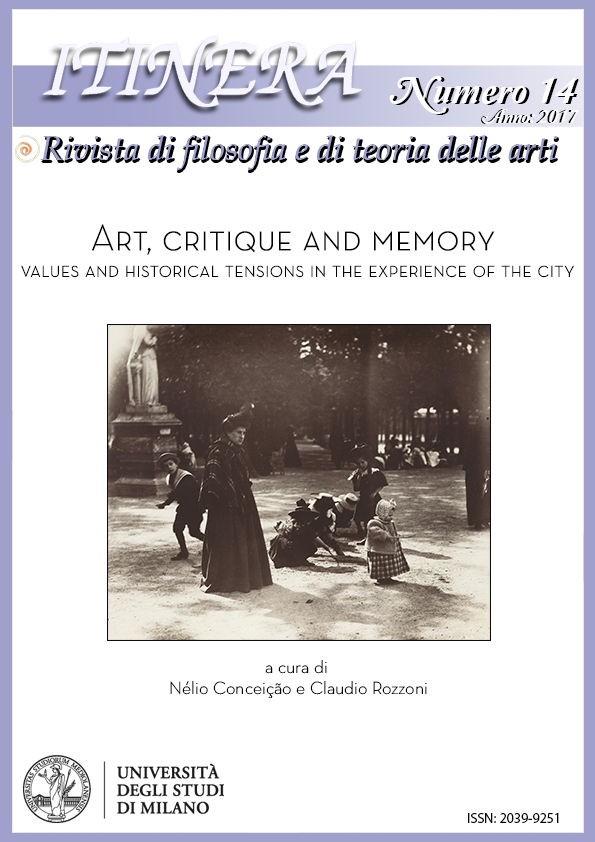En chantier
DOI:
https://doi.org/10.13130/2039-9251/9506Abstract
This essay aims at reading Walter Benjamin’s Einbahnstrasse taking into account five interrelated aspects: the “crisis of narrativity” and the kinship of Einbahnstrasse with the surrealist texts and the practice of montage; the importance – not only romantic but also intellectual and political – of Asja Lacis, to whom the work is dedicated; the writing of Einbahnstrasse as an attempt to answer, literarily and politically, to another “Strasse”, the one of the despair and of the inflation in Weimar Republic; the form of the Denkbild; the figure of the child that plays with the debris, like in the case of the poet in Baudelaire or the proletarian children’s theater founded by Asja Lacis – the connection between Spiel and Stoff.
Downloads
Riferimenti bibliografici
ADORNO, Theodor W., “Benjamins ‘Einbahnstrasse’”, in Über Walter Benjamin, Suhrkamp, Frankfurt am Main 1968.
Revue Alternative, Berlin (Est), numéros 56/57 (1967) et 59/60 (1968).
BARCK, Karlheinz, “Der Surrealismus. Die letzte Momentaufnahme der europäischen Intelligenz”, in Benjamin-Handbuch, Metzler Verlag, Stuttgart-Weimar 2006, pp. 386-399.
BENJAMIN, Walter, Einbahnstrasse, Gesammelte Schriften, IV-1, Suhrkamp, 1972. Traduction française de J. Lacoste, Sens unique, ed. 10/18, 1988.
—, Écrits autobiographiques, traduit par C. Jouanlanne et J.-F. Poirier, Christian Bourgeois, Paris 1990.
—, Gesammelte Briefe, volumes I-VI, Suhrkamp, Frankfurt am Main 1994-2000.
—, Gesammelte Schriften, volumes I-VII, Suhrkamp, Frankfurt am Main 1974-1989.
—, Œuvres I, II e III, traduit par M. de Gandillac, R. Rochlitz et P. Rusch, Gallimard, «Folio essais», Paris 2000.
—, Schriften, Th. W. Adorno et G. Scholem (réunis et ed. par), Suhrkamp, Frankfurt am Main 1966.
—, Sens unique, traduit par J. Lacoste, ed. 10/18, Paris 1988.
—, Ursprung des deutschen Trauerspiels, Gesammelte Schriften, Vol. I-1, Suhrkamp, Frankfurt am Main 1974.
—, “Zum Programm eines proletarischen Kindertheaters”, in Gesammelte Schriften, II-2, Suhrkamp, Frankfurt am Main 1977 ; “Programme pour un théâtre d’enfants prolétarien”, in Enfance, traduit par P. Ivernel, Rivages poche, Paris 2011, pp. 167-177.
BLOCH, Ernst, “Revueform in der Philosophie”, in Erbschaft dieser Zeit, Suhrkamp, Frankfurt am Main 1962.
GAGNEBIN, Jeanne Marie, “Le bois, les cendres, la flamme: de la critique chez Walter Benjamin”, Cahiers de l’Herne, Paris 2013.
HERACLITE, Fragments, Ed. Diels-Kranz.
LACIS, Asja, Revolutionär im Beruf. Berichte über proletarisches Theater, über Meyerhold, Brecht, Benjamin und Piscator, Rogner & Bernhard, Münich 1971.
LINDNER, Burkhardt, “Goethes Wahlverwandtschaften. Goethe im Gesamtwerk”, in B. Lindner (éd. par), Benjamin-Handbuch, Metzler Verlag, Stuttgart; Weimar 2006, pp. 472-493.
OLIVEIRA, Luis Inácio, Imagens da história – crítica literária e historiografia, Université de Campinas (Brésil), mars 2016 (thèse de doctorat).
RANCIERE, Jacques, Le partage du sensible, La Fabrique, Paris 2000.
RAULET, Gérard, “Einbahnstrasse”, in B. Lindner (éd. par), Benjamin-Handbuch, Metzler Verlag, Stuttgart; Weimar 2006, pp. 359-373.
SCHOLEM, Gershom, Geschichte einer Freundschaft, Suhrkamp, Frankfurt am Main 1975.
SMITH, Gary, “Denkerische Indifferenz” in Uwe Steiner (éd. par), Memoria, Walter Benjamin 1892-1940, Peter Lang Verlag, Bern; Berlin; Frankfurt am Main; New York; Paris; Wien 1992.
WITTE, Bernd, “Walter Benjamins Einbahnstrasse zwischen ‘Passage de l’Opéra’ und Berlin Alexanderplatz”, in U. Steiner (éd. par), Memoria, Walter Benjamin 1892-1940, Peter Lang Verlag, Bern; Berlin; Frankfurt am Main; New York; Paris; Wien 1992.
Dowloads
Pubblicato
Come citare
Fascicolo
Sezione
Licenza
Gli autori che pubblicano su questa rivista accettano le seguenti condizioni:
1. Gli autori mantengono i diritti sulla loro opera e cedono alla rivista il diritto di prima pubblicazione dell'opera, contemporaneamente licenziata sotto una Licenza Creative Commons - Attribuzione - Condividi allo stesso modo 4.0 internazionale che permette ad altri di condividere l'opera indicando la paternità intellettuale e la prima pubblicazione su questa rivista.
2. Gli autori possono aderire ad altri accordi di licenza non esclusiva per la distribuzione della versione dell'opera pubblicata (es. depositarla in un archivio istituzionale o pubblicarla in una monografia), a patto di indicare che la prima pubblicazione è avvenuta su questa rivista.
3. Gli autori possono diffondere la loro opera online (es. in repository istituzionali o nel loro sito web) prima e durante il processo di submission, poiché può portare a scambi produttivi e aumentare le citazioni dell'opera pubblicata (Vedi The Effect of Open Access).





